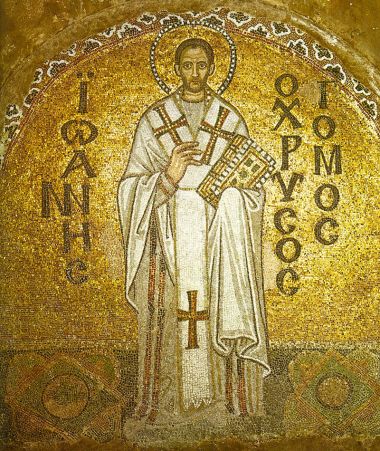John Chrysostom, the 4th century archbishop who fought corruption and helped the poor

When, in the fourth century ad, Christianity became the official religion of the Roman Empire, it lost the threat of persecution but gained new perils. As the church became popular, powerful and prosperous, a deadly formalism and corruption crept in. Into that troubled situation was born a man called John Chrysostom.
John was born in Antioch in Syria to a Greek family in AD 347. John was given a good education and learned rhetoric – the skill to speak effectively in public. After a reckless youth he turned to Christ in his twenties. He became a monk and lived such an austere lifestyle for several years that it affected his health. Of greater long-term benefit were his efforts to memorise the entire Bible.
John moved from the monastic life for the church and became a priest in AD 386. For twelve years he remained in Antioch, preaching frequently and drawing large crowds. John was more than just a clever speaker. He spoke clearly to ordinary people with messages that were simple and practical, and used illustrations from everyday life. John constantly appealed to the Bible as God-given authority. It is claimed that his eyes shone 'like burning torches'.
John was a gifted communicator and his sermons are some of the very few from the ancient world that can still be profitably read today. He also wrote many commentaries, showing the same common sense and practical application.
John had intended to stay in Antioch but the Emperor felt that Constantinople, the eastern capital of the Roman Empire, needed someone of quality to occupy the pulpit. The result was that John was kidnapped in AD 398, taken to Constantinople and persuaded to be bishop.
It was not a happy appointment! The authorities wanted a superstar preacher; instead they got a man of God. Standing on the authority of the Bible, John sought to reform both the church and his society. Rejecting all attempts to pressure or limit him, he attacked extravagance and immorality, and did all he could to deal with corruption within the church.
He preached against excessive wealth: 'It is foolishness and a public madness to fill the cupboards with clothing and allow men who are created in God's image and likeness to stand naked and trembling with the cold so that they can hardly hold themselves upright.'
He practised what he preached. He sold off some of the art in the bishop's palace, refused to give lavish dinner parties, and criticised anything that involved excessive wealth and spending. Straightening out a corrupt financial system, John saved enough on his expenses in his first year to build a hospital for the poor. His attacks, not just against excessive wealth but against a whole range of social ills, gained him the friendship of the downtrodden and the hostility of the powerful.
He refused to play politics and so it is hardly surprising that after five years he found himself banished from Constantinople to the edge of the Black Sea. There, in exile, he died in 407 and his last words were, 'Glory be to God in all things. Amen.'
Sixteen centuries lie between us and John Chrysostom and yet he still challenges us.
- John was a model evangelist. He had fire in his belly and logic in his brain; he preached Christ with urgency and life, in a language that all could understand. He lived to proclaim the gospel and once said to his congregation, 'Preaching improves me. When I begin to speak, weariness disappears; when I begin to teach, fatigue too disappears . . .' There was, too, an extraordinary urgency to his message. As he said, 'There is nothing colder than a Christian who does not seek to save others.'
- John was also an evangelist with vision. In marked contrast to most of his contemporaries, he saw beyond his own city and community, sending out church planters into the Danube Valley and eastwards to what is now Iran.
- John was a man who preached that right beliefs had to be matched with right actions. He wanted to see his society and his church cleaned up.
- John was a biblical man. He took his stand on Scripture and taught that it had supreme authority. He encouraged his hearers to read the Bible too.
- John proclaimed a simple lifestyle. He consistently opposed excess wealth and self-indulgent luxury.
John Chrysostom is an awesome figure. In troubled times he spoke out for an authentic Christianity; a faith centred on Christ, guided by the Bible and utterly independent of every pressure of culture. John was indeed a 'golden mouth' for the gospel: our age needs more men and women like him today.
Canon J.John is the Director of Philo Trust. Visit his website at www.canonjjohn.com or follow him on Facebook, Instagram or Twitter.











